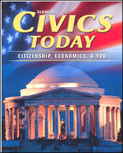
Civics Today Citizenship, Economics, & YouChapter 12: State GovernmentChapter OverviewsThe Framers of the Constitution created a federal system of government. In federalism the central government and the state governments share power. If a conflict arises, however, the federal law is considered to be supreme. Each state has its own constitution. The Tenth Amendment to the U.S. Constitution establishes that state governments may exercise all powers not given to the federal government or denied to the states. Each state is responsible for the public health, safety, and welfare of its citizens. State lawmaking bodies vary in name and size. Only Nebraska has a unicameral legislature. All others are bicameral. A governor heads each state's executive branch. State courts handle most of the nation's judicial business. In most states, the courts are organized in a three-tiered system that resembles that of the federal court system. There are lower trial courts, appellate courts, and state supreme courts. State judges are selected in different ways. Some are elected by popular vote; others are elected by the state legislature. In other states, the governor appoints judges. |  |















